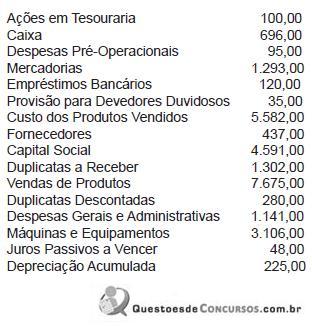Questões de Concurso
Para analista tributário da receita federal
Foram encontradas 498 questões
Resolva questões gratuitamente!
Junte-se a mais de 4 milhões de concurseiros!

Ao realizar o levantamento do balanço patrimonial, o Contador da empresa certamente encontrará um Ativo total no valor de
I. Que tenha menor número de dependentes. II. Pertencente ao serviço público municipal de Itaiópolis e suas Fundações instituídas e mantidas, que possuir maior tempo de efetivo exercício nesta condição. III. Que tiver obtido melhor grau na matéria de peso mais elevado. IV. Já pertencente ao serviço público municipal de Itaiópolis e suas Fundações Públicas, instituídas e mantidas.
Está CORRETO o que se afirma:
Entre eles, é correto citar
I. O começo da alienação de bens por quem seja devedor perante a fazenda pública por crédito tributário inscrito na dívida ativa é considerado fraudulento.
II. O crédito tributário é o n. 1 na ordem de prioridade de pagamento dos débitos por empresa insolvente.
III. Na falência o crédito tributário prefere aos créditos extraconcursais.
A queda de rentabilidade das exportações se agrava(1) a cada dia em razão da valorização do real. Tudo indica que a moeda nacional deve continuar a se valorizar(2) e o Banco Central (BC), apesar das suas intervenções cada vez maiores, está impotente diante dessa valorização, que torna mais difícil a exportação e favorece a importação, ameaçando o crescimento da indústria nacional. O governo se mostra(3) incapaz de encontrar um modo de compensar esse efeito.
Está-se(4) observando também uma queda no quantum das exportações de manufaturados, de 17,4% nos sete primeiros meses do ano, junto com uma queda de preços de 5,5%, enquanto nos produtos básicos um aumento de 6,5% no quantum correspondeu a uma queda de 16,1% nos preços.
Não se pode(5) pensar que o fl uxo de dólares possa diminuir nos próximos anos e, assim, criar um ambiente muito favorável a uma desvalorização, pois os Investimentos Diretos Estrangeiros devem crescer, a Bolsa de Valores acompanhará a melhora da economia e a produção de petróleo, apesar da criação de um fundo especial, aumentará as receitas.
(O Estado de S. Paulo, Editorial, 14/10/2009)
(1) Lançamento direto. (2) Lançamento por declaração. (3) Lançamento por homologação.
( ) Quando sua iniciativa competir à Fazenda Municipal, sendo o mesmo procedido com base nos dados apurados diretamente pela repartição fazendária junto ao contribuinte ou responsável, ou a terceiro que disponha desses dados. ( ) Quando a legislação atribuir ao sujeito passivo o dever de antecipar o pagamento sem prévio exame da autoridade fazendária, operando-se o lançamento pelo ato em que a referida autoridade, tomando conhecimento da atividade, assim exercida pelo obrigado, expressamente o homologue. ( ) Quando for efetuado pelo fisco, com base na declaração do sujeito passivo ou de terceiro, quando um ou outro na forma da legislação tributária, presta a autoridade fazendária informações sobre matéria de fato, indispensável a sua efetivação.

